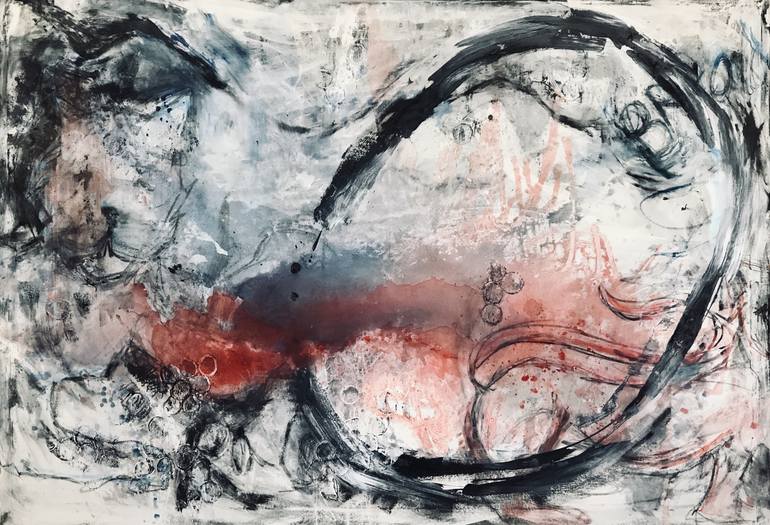





VIEW IN MY ROOM
Divide & Conquer Painting
United States
Painting, Acrylic on Canvas
Size: 84 W x 54 H x 2 D in
Ships in a Tube
About The Artwork
Despite their small size, raisins are rich in fiber, vitamins, minerals, and packed with energy. But not everyone likes them, and they don't always combine well in every type of food. My grandmother used to like them, but over the years she couldn't stand them anymore. And she had a reason for that. Cyprus, the island in the Mediterranean Sea where I was born and raised, was under the British Protectorate from 1878 to 1914, then under the British military occupation from 1914 to 1922. Cyprus then became a British Crown Colony from 1922 to 1960. During those years, the island had a high production of grapes, so the British Empire decided to make the excess grapes into raisins. At the same time, the British Crown forced the inhabitants of the island to use the raisins in their bread, and there would be consequences if they did not comply. My grandmother didn't like to have the sweet raisins in her bread, so she had to make two types of bread, one the way she liked it (without raisins), and one with raisins (for the satisfaction of the Royal Crown). She would always have the bread with the raisins placed on the counter, in case a British soldier was to knock on her door, but she would hide her “real” bread, as she called it, in a sack of flour. I knew that times were hard during the Colonization, and that the people were forced to endure a lot of oppression, but I never knew that they were monitoring everyone to this extent. We often think about the Royals and the British Empire as a positive influence on the people, bringing civilization and technology, but the truth is that the colonized inhabitants suffered immensely under the British Empire. When one's freedom is taken away, that can only bring suffering and humiliation. “Divide and Conquer” is a strategy that was first used by the Roman and British Empires. This strategy is still used today, directly or indirectly, by many countries in the arena of politics and sociology. Here in the United States, it is the Liberals v. Conservatives, the Democrats v. Republicans, and as they continue to fight, the real enemy continues progressing. In my latest body of work, I am symbolically depicting the strategy of Divide and Conquer, based on the British Colonization of Cyprus and from my grandmother's and mother's experiences. I use the imagery of raisins and the word “raisins” over and over again, emphasizing through repetition the daily suffering that the Cypriots went through, while also creating a comparison to current events, where the strategy of Divide and Conquer is being used in a variety of forms by numerous countries.
Details & Dimensions
Painting:Acrylic on Canvas
Original:One-of-a-kind Artwork
Size:84 W x 54 H x 2 D in
Frame:Not Framed
Ready to Hang:Not applicable
Packaging:Ships Rolled in a Tube
Shipping & Returns
Delivery Time:Typically 5-7 business days for domestic shipments, 10-14 business days for international shipments.
Handling:Ships rolled in a tube. Artists are responsible for packaging and adhering to Saatchi Art’s packaging guidelines.
Ships From:United States.
Have additional questions?
Please visit our help section or contact us.
United States
Tatiana Soteropoulos was born in Nicosia, Cyprus, and studied with a Fulbright Scholarship at the Columbus College of Art and Design in Columbus, Ohio, U.S.A. She graduated Magna Cum Laude with a Bachelor of Fine Arts Degree in the Division of Illustration. She has done freelance work for advertising firms, collaborated with publishing houses, and illustrated over twenty children’s books. She has exhibited her artwork in many solo and group exhibitions in Cyprus, Spain, Slovenia, Italy, Slovakia, New York, New Jersey, Miami, Florida and Los Angeles. She created the designs for the new national currency of Cyprus, and these illustrations were chosen by the Central Bank of Cyprus to become the first Euro ever issued for the country. She has also represented Cyprus in the 18th Biennial of Illustrators in Bratislava, Slovakia, in the 6th Beijing International Art Biennale in Beijing, China, in Osten Biennale of Drawing, in Skopje, North Macedonia and most recently in the first Larnaca Biennale, in Larnaca, Cyprus. Her work is owned and exhibited by many national and international organizations, as well as in Museums. Currently Tatiana resides in the U.S.A.
Thousands Of Five-Star Reviews
We deliver world-class customer service to all of our art buyers.
Global Selection
Explore an unparalleled artwork selection by artists from around the world.
Satisfaction Guaranteed
Our 14-day satisfaction guarantee allows you to buy with confidence.
Support An Artist With Every Purchase
We pay our artists more on every sale than other galleries.
Need More Help?